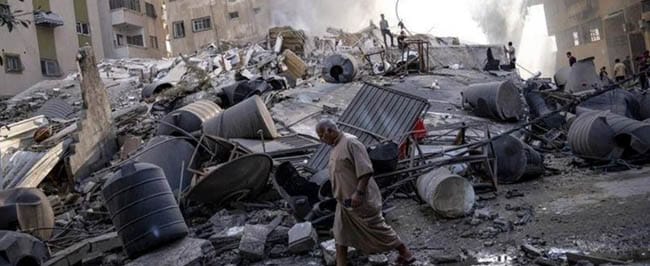
by Sweta Choudhury
Stop the War Coalition (UK), August 30, 2024
One of the most graphic depictions of the environmental costs of war was when 700 of Kuwait’s oil fields were set ablaze during the first Gulf War leaking an astounding 11 million barrels of crude oil into the Persian Gulf and creating a smoke plume stretching 800 kilometers. Nearly 300 oil lakes developed inland on the desert’s surface, contaminating the soils for many years.[1]
Two decades on and after many such disasters in war zones around the world and endless analysis and debate over the relationship between wars and climate change, Israel’s genocide in Gaza is once again exposing the lethal, planet-warming emissions of wars. Yet governments around the world, including ours, largely ignore the impact of foreign policy and defense choices on the climate.
According to a preliminary assessment published by the UN Environment Program (UNEP), the environmental impact of the war in Gaza is unprecedented, exposing the community to rapidly growing soil, water and air pollution and risks of irreversible damage to its natural ecosystems.[2]
Another piece of research reveals that carbon emissions during the first two months of the war in Gaza were greater than the annual carbon footprint of more than 20 of the world’s most climate-vulnerable nations.[3]
The West’s support for Israel’s genocide and the failure of the international community to bring an end to this catastrophic war has once again highlighted their damning hypocrisy on the climate crisis. On one hand, they keep prattling about the perils of the climate breakdown, yet they fail to acknowledge the mounting concern about the long-term effects of Israel’s war and occupation. But it’s not just the carbon footprint of the war that is staggering. Reconstructing Gaza will come at a bigger environmental price. It has been estimated that Gaza’s reconstruction will generate nearly 60m tonnes of CO2. The emissions associated with rebuilding Gaza are projected to be higher than the annual emissions of over 135 countries, equating them to those of Sweden and Portugal.[4]
The Palestinian people have long been the victims of war and occupation but they are also in a region that is most vulnerable to the effects of climate change. The Gaza strip, the West bank and the areas surrounding it are predominantly hot areas with a large part of the territory arid or semi-arid.[5] And with climate change, the rise in temperatures and lack of water are becoming more extreme.[6] The effects of climate change, such as water scarcity, food insecurity, and extreme weather events, are further exacerbating the humanitarian crisis in Gaza and threatening the well-being of its remaining population.
The war in Gaza is just a glimpse of the larger military boot print of wars and the military industrial complex. Military emissions are at an all-time high and recent data reveals that global CO2 emissions were 182 times higher in 2022 than they were in 1850.
The war in Ukraine teaches us similar lessons about the carbon footprint of wars. A comprehensive study by EcoAction revealed that since the invasion, 175 million tons of CO2 and other greenhouse gases have been released into the atmosphere. In Yemen, Somalia and Sudan, war and climate change are intensifying the humanitarian crises with rise in endemic and epidemic diseases, extreme drought and flooding and food shortages. Vulnerable war-torn countries like Syria, Afghanistan and Iraq continue to grapple with climate change driven extreme weather and related disasters and have been left to adapt to the cruel realities of climate change on their own without proper funding and support.
The COP UN climate conferences have repeatedly failed hold the military industrial complex accountable for its staggering emissions. And it’s not just emissions from fossil fuels but also the radioactive contamination from nuclear energy that militaries need to be held accountable for. In fact, last year at COP28, there were “no outcome documents that mentioned the contribution that military activities or warfighting makes to the climate crisis.”[7]
The US was the highest military spender in 2023, with $916 billion dedicated to the military. They only pledged $17.5 billion to the COP28 loss and damage fund while Israel, Russia and Ukraine, who are causing huge wartime environmental destruction and increasing military greenhouse gas emissions, didn’t pledge anything. While military emissions may have been missing from the negotiations, and the outcome document, militaries certainly weren’t missing from the conference with NATO Secretary-General Jens Stoltenberg making disingenuous statements about impact of climate change on defense, the toxic legacy of wars, and the need for net zero militaries.[8]
Climate activists have long demanded that wealthy nations should divert 5% of their military budgets to climate finance.[9] While military spending has increased exponentially, exceeding $2.2 trillion in 2022, only $90bn was spent on climate finance in 2021, far below the required amount to tackle the climate crisis. Without cutting unnecessary military spending, especially by the 31 NATO members states, who account for more than half of all global military spending and whose total emissions account for over 233 million metric tonnes of CO2 equivalent green house gases, we cannot achieve the climate goals that have been set out.
The evidence is out there. Wars, NATO and the military industrial complex are three of the biggest contributors to the climate emergency. The unwillingness of governments and policy makers to enact foreign and defense policies that will reduce future military emissions must be challenged. Only by building a strong antiwar movement that focuses on the catastrophic environmental impact of militarism and campaigns effectively to end it can we truly begin to tackle climate devastation.
[1] https://unfccc.int/news/conflict-and-climate
[2] https://www.unep.org/news-and-stories/press-release/damage-gaza-causing-new-risks-human-health-and-long-term-recovery
[3] https://www.theguardian.com/world/2024/jan/09/emissions-gaza-israel-hamas-war-climate-change
[4] https://www.qmul.ac.uk/media/news/2024/hss/new-study-reveals-substantial-carbon-emissions-from-the-ongoing-israel-gaza-conflict.html
[5] https://earthjournalism.net/stories/cop28-how-the-wars-in-ukraine-and-gaza-affect-climate-action
[6] Ibid.
[7] https://ceobs.org/always-money-for-war-reflecting-on-cop28/
[8] Ibid.
[9] https://www.theguardian.com/environment/2023/dec/02/cop28-climate-change-military-funds


